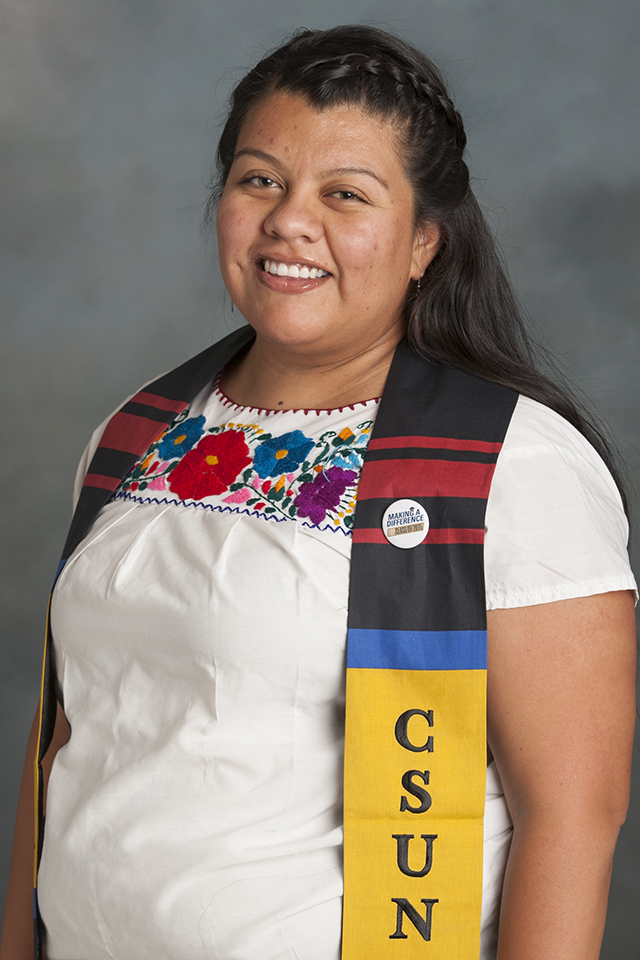Chicana/o Studies Major Receives Top Graduate Student Award
Angelica Amezcua ’11 (Chicana/o Studies/Spanish) had a hard time adjusting when her family immigrated to the United States from Mexico. Then 11 years old, she couldn’t speak English and was accidentally placed in an all-English-speaking class. She begged her mother to take her back to Mexico.
“It was really traumatizing,” Amezcua recalled. “I felt lost and frustrated.”
Today, Amezcua — who will be recognized during her graduation ceremony on the evening of May 18 as this year’s Nathan O. Freedman Outstanding Graduate Student, the highest honor presented to a California State University, Northridge graduate student who shows the best record of distinguished scholarship — is glad she remained in the United States. To qualify for the honor, candidates must maintain a minimum GPA of 3.5. The 27-year-old Amezcua has a grade point average of 3.87.
“I’m glad my mom did not take us back to Mexico,” said the 27-year-old Amezcua. “She understood better than me that in order to achieve ones goals, one might face many obstacles.”
Amezcua credits the support she received from her family, friends and CSUN faculty and staff with her success. She grew up in the Ventura County community of Fillmore, where both her parents worked as farmworkers. Her parents placed a high value on Amezcua’s and her siblings’ education.
“My mother, Concepcion, was always involved in our education and would volunteer in our school to make sure we behaved and did well in our classes,” she said. “She [Amezcua’s mother] instilled in us the value of education, which helped me and my sisters overcome all the obstacles we have faced in our educational journey.”
The oldest of four, Amezcua served as a role model for her siblings. Her sister Mayra graduated in 2013 with a bachelor’s degree in liberal studies from CSUN; her sister Susana will graduate this week with a double major in Chicana/o Studies and sociology from CSUN; she is confident that her 12-year-old brother, Tommy, will follow in his sisters’ footsteps.
Amezcua arrived at CSUN in 2006 with her three best friends. They all worked together to prepare and apply to college. With the support of the Educational Opportunity Program and faculty in the Department of Chicana/o Studies, she and her friends graduated in 2011. Faculty encouraged her to remain at CSUN and pursue a master’s degree in Chicana/o Studies.
While at CSUN, Amezcua has been active on campus as a supplemental instruction leader in the Learning Resource Center, as the co-coordinator of the EOP Parent/Guardian Initiative and as a graduate assistant in the College of Humanities Mentorship Program. She served as an active member of the Chicana/o Studies Student Association, Kalpulli Mentorship Program Coordinator and graduate student representative on the CSUN Educational Equity Committee. She also has made numerous presentations and contributed to the book Latinos and Latinas at Risk [2 volumes]: Issues in Education, Health, Community, and Justice, which explores the Latino/a presence in the United States.
Chicana/o Studies professor Ana Sánchez-Muñoz, Amezcua’s thesis chair, has helped her explore the field of linguistics, focusing on the connections between language and identity. She was part of the Seventh Heritage Language Research Institute at the University of Illinois at Chicago, where she was exposed to different approaches within the discipline. Last summer, she was given an opportunity to work with UCLA professor Claudia Parodi as part of the Sally Casanova Pre-Doctoral Scholar Summer Program.
As a result, Amezcua has been accepted into a doctoral program in Spanish at Arizona State University, in the heritage language track. Her long-term goal is to return to CSUN to teach Chicana/o Studies.
“CSUN has prepared me to go to the next level,” Amezcua said. “I discovered my potential here.”


 experience
experience